

Before the Lakota recorders, Jason the captain of the Argo, who led the Argonauts' expedition to regain the Golden Fleece, foresaw this apparition heading for Earth:


R E T R O S T A R
D I R E C T O R Y
A N D
L I N K I N G
P A G E

RETROSTAR, OR, THE CIRCULAR WEB:
Chronicles of a Twin Earth, Sun, and Solar System Under Siege
Dedicated to Gabriel Tall Chief who first blew the horn and to M.G.Y. (Marty Gantry Yeager aboard RMS TITANIC) who couldn't hear it...

WELCOME TO THE TWIN EARTH(S)!



THE TEN HEAVENLY STONES OF FIRE--FROM THE BIBLE: Ezekiel 28: 13-14:
"Thou has been in Eden the garden of God; every precious stone was thy covering, the Sardius, Topaz, and the Diamond, the Beryl, the Onyx, and the Jasper, the Sapphire, the Emerald, and the Carbuncle, and Gold...thou art the anointed cherub that covereth; and I have set thee so: thou wast on the holy mountain of God; thou has walked up and down in the midst of the stones of fire." Note: Each fiery stone of heaven is corrupted by the fallen cherub, Lucifer, the "Light-Bringer" who was Keeper of the Stones, and it acquires a different character and a guiding deadly creature of evil genius hidden within it.


WELCOME TO VOLUME I, FATAL CONVERGENCE! This is the ill-starred point of entry for the First Alien Entity!
The great, state of the art, "unsinkable" Ship of the World has set sail on its maiden voyage with its cargo of fools, both fabulously rich and contemptibly poor, educated and uneducated, moral and immoral, beautiful and ugly, tall and short, nice tempered and ill-tempered, with nice teeth or with bad teeth, brown eyes and blue, or black and hazel--a complete human spectrum if there ever was one assembled together on one huge vessel. Certainly, there was more than room enough on this one. As tall as a New York skyscraper of that day, she was a city afloat, all the social classes present and working more or less amicably together to get to their destination, the New World's portal of New York, where they would part and, except for the super rich, never see each other again. Yet as sometimes happens with management at the highest levels, arrogance sets in, and just a tinge will do, impairing judgment and producing flawed decisions that, in the Titanic's case, proved just as fatal as it once did for the once mighty Titans who committed hubris and lost Atlantis.
That precondition corrupts everything man puts his hand to. A brain scan now to read people's thoughts? British scientist from University College London can now identify thought patterns by using functional magnetic resonance (fMRI). Chillingsworth's Ultimate Weapon, utilizing his brain scanning creation, is next to be developed. Terrorists can be identified by the fMRI, very soon now. The Ultimate Weapon is next, to not only identify but eliminate anyone who is a "terrorist," that is, anyone who opposes the coming World Government.
Sailing full steam ahead to New York and, ignoring every warning, straight into an ice field...

Aboard the ill-starred liner a little girl in First Class lay in bed, troubled with a bad dream about people, some she could recognize, splashing about in nasty cold, icy water, screaming louder than she was ever allowed to scream, while her nanny sat beside her reading her naughty French novel of illicit romance between a governess and a duke in a Gothic castle.

"Lullaby for TITANIC,"
by Eben Chen
I
Beneath the waters so cold and deep
A once great ship has gone to sleep.
No stewards, no crew, no Countess of Rothe,
Their lives fill the dustbin that conquered the Goth.
REFRAIN: Lullaby, Lullaby, rest thy soul, child,
Till you die;
Lullaby, Lullaby,
The wheat and tares together lie.
II
Fins fan the rust of staterooms’ dark decay,
Their gold and jewels in Time’s hand slip away.
No ship horn blast, no thundering steam,
A Ghost lies in pieces—a gray, silent dream.
REFRAIN
III
So sleep on, Titanic, your unreaped souls
Await the great Trumpet and the wrath of Bowls.
Your voices were stilled when you drank the last wave.
An Astor beds with stokers, a reverend with the knave.
REFRAIN
IV
The city shyster turned the bed
The village matriarch was laid—-
The Rubaiyat of Khayyim with Grey’s pure, milk-white maid.
So sleep on, gray Dreamer, until the last Trump,
And the angels cast doom on the earth’s blasted stump.
REFRAIN: Lullaby, Lullaby,
rest thy soul, child,
Till you die;
Lullaby, Lullaby,
The wheat and tares together lie.

Kiowa sages recorded the Great Canoe's sinking on their cowhide calendar.

Ero the Cybernaut also gazes into the devouring mouth of the Red Star:

In its path, planets and stars and entire galaxies are consumed by the red-flaming star which is able to expand galactically as well as shrink to ringstone size:

CHRONICLE ONE, PART I, VOLUME I, FATAL CONVERGENCE, RETROSTAR
Dr. Pikkard, Dutch Genius/Retrostar's Cosmic War Challenger # 1
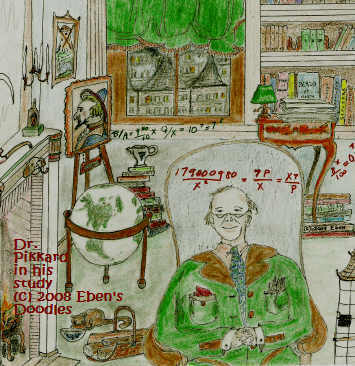
At certain points in the war, Dr. Pikkard's greatest creation, the intrepid e-butterfly named Wally, is the lone combatant, as when he circled the earth at the side of the red blazing star.
Our RetroStar Chroniclers:

Gabriel Tall Chief, confined to bed in a children's hospice the remaining days of his CP-shortened life, shone like a pure blue star of heaven (which is awarded to those who fall in battle) in a red-star-dominated world. Which was more powerful? Only time and events will tell:


Gabriel's disciple and dream-weaver and dream-rider, Horace Brave Scout, who gathered the "fragments" of the chronicles that remained after Gabriel died and made a great leap for mankind by riding the dreams of others to fulfillment before he rode his own.

Chronicler Horace Brave Scout, Gabriel Tall Chief's heir, playing "Amazing Grace."


The Series of the Twin Earths is available on disk or can be electronically transmitted. The series consists of: RETRO STAR, Vol. 1, Fatal Convergence, Vol. 2, Cloud and Avalanche, Vol. 3. Battles of the DUBESOR, Vol. 4, Lost Chronicles; Part Two, Unchronicles, Vol. 5, Natal Convergence, Vol. 6, Beyond the Rapture, Vol. 7. Final Wars...Convergence at Orion

A "Letter to Agent, Outlines, and Overview and Marketing Strategy" of the Series":
Agent Letter, Outlines, Strategy
A Last Word Count in ANNO STELLAE 1997: 1,400,000

Outlines for VOLUME I, RETROSTAR:
CHRONICLES 1-24--WHAT'S IN THEM?
CHRONICLE ONE--WHAT'S IN IT?
CHRONICLES TWO TO SIX--WHAT'S IN THEM?
CHRONICLES SEVEN TO NINE--WHAT'S IN THEM?
CHRONICLES TEN TO TWELVE--WHAT'S IN THEM?
CHRONICLES EIGHTEEN TO NINETEEN--WHAT'S IN THEM?
CHRONICLES TWENTY TO TWENTY-THREE--WHAT'S IN THEM?
CHRONICLE TWENTY-FOUR--WHAT'S IN IT?

OUTLINES, CHRONICLES ONE TO FORTY-FIVE
OUTLINES, CHRONICLES FIFTY-EIGHT TO SIXTY TWO

Main Game Players (Earth II):
1. Ever wondered why the "Titanic" was named that? It wasn't the luxury liner's colossal size alone, which is the secondary meaning, since there were colossal-sized vessels built and sailed before this time. Rather, her namesake was the non-human race of Titans (Atlanteans) who built and then lost Atlantis on the twin Earths; then tried repeatedly to re-assert their rule over Earth II; they are a super-powered species that has turned vampire and lives almost indefinitely, as they blend with vigorous animal species and also are able to inhabit hybrids of their own making. With so much going for them, they should be supreme and unbeatable. Yet they have a fatal flaw. Their major downfall, besides arrogance that led to hubris, was constant in-fighting and power struggles as this claimant and that claimant for the throne duked it out, with no gloves and no holds barred. A house divided will fall, and theirs proved no exception.
2. The Ten Stones of Fire (Starlike, Jeweline, Super-intelligent, Alien Entities), each performing as OP, or, Opposing Player, with the aim of conquering and destroying the Earths, I and II, and their respective universes.
3. Dr. Pikkard's Computer Wargame, represented by Wally, an electronically-created, free-roaming butterly who fights for humanity's survival against the Alien(s)
4. Human "Alphabetic" or A-Z Champions, also a subgroup called DUBESOR, or the Rosebud Champions
5. Yeshua, the A and Z, the Alpha and Omega, and the Aleph and Tau (also known as FC from the 21st Century onward, the so-called "Forbidden Category" that all politically correct societies vehemently rejected.)

LIKE ANY THISTLE OR WEED, EVIL CANNOT ARISE SPONTANEOUSLY FROM NOTHING. EVIL SPRINGS FROM PREPARED, THAT IS, DISTURBED SOIL--AND THE BEST PREPARATION SINCE TIME IMMEMORIAL IS SOIL THAT IS RADICALLY TORN UP BY WAR OR HUMAN STRIFE. EVEN BEFORE THE TITANIC'S SPECTACULAR MAIDEN VOYAGE AND DIVE TWO AND A HALF MILES DOWN IN THE NORTH ATLANTIC TO THE EDGE OF THE ABYSS, RECORDED IN CHRONICLE ONE, SOME CLUES ARE GIVEN US. FOR INSTANCE: ON BOTH EARTH I AND EARTH II A CERTAIN CHOICE OF A YOUNG RUSSIAN ARISTOCRAT'S FIANCE (UPPER CLASS, KREMLIN-BORN AND BRED DAUGHTER OF A COURT PHYSICIAN, KNOWN LATER AS ONLY THE "OVERLY POSSESSIVE" WIFE OF THE NOBEL PRIZE-WINNER COUNT LEO TOLSTOY) PREPARED THE WAY OF THE ALIEN ENTITY ON EARTH II AND THE DRAGON ON EARTH I: FOR THIS CHECK OUT SCENARIO I. THEN RETURN FOR SCENARIO II, WHICH REVEALS THE GREAT RECORDER HIMSELF, CHRONICLER GABRIEL TALL CHIEF. FINALLY, SCENARIO III, WHERE A KREMLIN STARETZ (PROPHET) REVEALS YEARS BEFOREHAND WHAT IS GOING TO HAPPEN IN THE ILL-STARRED 20TH CENTURY OF BOTH EARTHS, WHEN SOMETHING WORSE THAN THE H5N 1 STRAIN OF THE BIRD FLU VIRUS IS INFECTING THE TWINS, SO THAT THEIR INTERTWINED FATES ARE ALMOST IMPOSSIBLE TO SEPARATE FROM EACH OTHER.

RETROSTAR CHRONICLES:
RETROSTAR CHRONICLES DIRECTORY
Some centers of lost non-human super-civilizations on the Twin Earths:

Earth I's supercontinent, which may have contained all the continents which presently exist:

Earth II's lost first civilization, Mukalia, and its continent:

Earth II's second "Mother Continent," Atlantis II, after the Re-Location of the Planet:
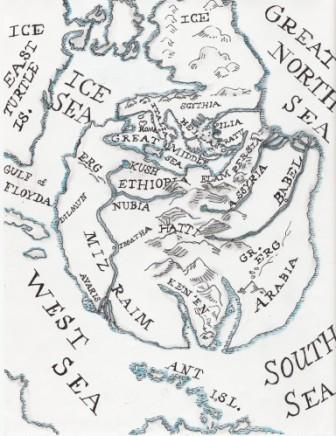
After the secularist, self-deifying Atlanteans gained total control of Earth II, world supremacy was not enough, they turned to fighting amongst themselves in endless dynastic struggles for the imperial throne. That they ultimately destroyed their own future by almost constant battles that bled them low in numbers and technology was not as important to them as who, what prince or princess, gained the upperhand over other claimants and temporarily occupied the throne. This is the fatal flaw of the Atlanteans: the fanatical, even sociopathic worship of supreme state power, and no god but themselves to wield it (they really believed they were each individually a god), which meant that each Titan believed he or she alone was entitled to supreme power. Shirley MacLaine, J.Z. Knight, Oprah Winfrey--pathetic caricatures of real Titans, yet claiming the same godhead and powers! See how these godlings strut and parade! They can be seen in the corridors of political venues and the entertainment world today, loaded and larded with honorifics, strutting and posturing to intimidate and impress masses of slaves, beggars and sychophants, while keeping an eye out for rivals, stalkers, and assassins that are probably lurking in the shadows.

Aeneas, Founder of Roma, flees burning Troy with his wife and child, carrying his aged father Anchises
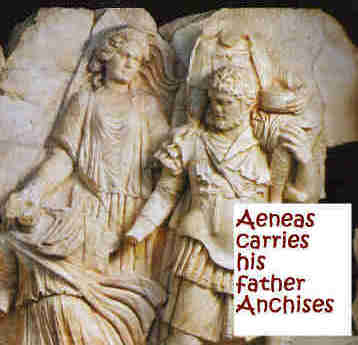

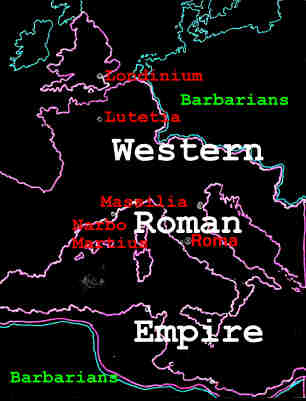

Eight year old Honorius Urbanus and his distinguished father made a special trip all the way from Glevum in southwestern Britannica to Roma, the ruling capital of the world. It did not start so auspiciously, however, after they crossed the water and traveled through barbarian- ravaged Gaul. Even northern Italia (Cisalpine Gaul) was just as broken up.
Rufus Urbanus was upset, for the sake of his Honorius. Was this to be the memory of it bequeathed by a father to his son? If so, it was a bad journey! Rufus thought, feeling he should have gone alone and faced such things rather than expose his young son to them. Yet further on they found the real borders of the shrunken Western Empire still held firm, for the time being anyway. Beyond was Roman civilization as it had always been--glorious and proud and well-ordered--and they proceeded south on the Roman road directly to the Queen City itself. There young Honorius would see the sights that would forever blaze in his memory: Roma in her full glory and splendor, a city beyond description, the like of which the world had never seen before and would never see again after the barbarians broke through the borders and had their way with her.
Chronicle of the Phoenix of Britannica, Out from the Ashes, Vol. IV, Retrostar
Unchronicle of the Road to Roma, Vol. IV, Retrostar

UNCHRONICLE OF THE LAST SHIP FOR MASSILIA, VOL. IV, RETROSTAR
The Classical World had a Terminus, in fact, two, one at the end of the Mediterranean and the province of Britannica at Hadrian's Wall, the other set up by Hadrian at the mouth of the Euphrates. But the most telling Terminus was the end of Roma in the West, with the Fall of Roma to the barbarians in 410, only a few years away from the tour of Rufus Quartus Urbanus and his young son, Honorius. The final collapse took a long time, extending over years. But the signs were everywhere that the whole civilization of the Ancient World was at last unravelling and coming to an end, at last in the Western empire.
Atlantis also had a Terminus. It had seemed too mighty too ever fall, just like the Roman Empire 10,000 years afterwards. But might and power could not save it. Yet it cast some fatal seeds as it gave up life. Though effectively destroyed except for a wandering, fractured, Topaz-bedeviled colony that could never find a lasting home away from home, Atlantis must have left shreds of its soul behind, which is the only explanation for the Roma's spectacular rise to a superpower and world state from its inauspicious beginnings as a cow town at a ford on the Tiber River. Once it achieved greatness and an empire, it became painfully clear that parvenu Roma needed something to cover up its rather smelly, brutish origins, so the best poets and historians were put to the task. The state annalist, Livy, did his best, tying together the threads of musty, rather dubious myths like Romulus and Remus, the orphaned twins, suckling a she-wolf until they were grown and later fighting it out, the wolf milk perhaps activating their rivalry, and Romulus slaying his brother and becoming the founder of Roma. A city founded on fratricide, two brothers who duked it out for the honor? Virgil the poet did a little better in order to attribute glory to Caesar Augustus's throne, person, and reign. A queen city needs a royal or at least a noble ancestor, so he wrote the great verse epic, the Aeneid, connecting Roma's founding with with Prince Aeneas, the noble son of Anchises who had fought for Priam the last king of Troy, thus borrowing from the Greeks some of their illustrious past to gild over Roma's humble cow yard and river crossing antecedents. Aeneas, according to the narrative Virgil adapted for his epic, fled from sacked Troy with his father, wife, and little son Ascanius and sailing by way of Carthage (and Queen Dido's loving arms) reached Latium, and became the ancestor of Roma's founders. None but simple-minded people seriously believed these fanciful accounts, but in the hands Livy and Virgil they gained a certain degree of plausibility, and Augustus sanctioned Virgil's epic, did he not? What did he have to lose thereby? And the Romulus and Remus story seemed to explain the city's name. So they stuck fast, some 700 years they reckoned since their founding date, and Roma now thought it possessed a proper and respectable foundation to explain its phenomenal rise to glory and power over all the other nations.
Atlantean soul-shreds never quite left Italia, even if Roma could not monopolize them forever. Other cities in Italia took them up and were catapulted to glory and power--Venetia, Florentia, even Ragusa on the eastern Adriatic and Illyrian coast chief among them, ruling with the scepter and authority and noblesse oblige of ancient Roma. Even at the time of Rutilius in the early 5th century, Roma had first sunk to being one of two capitals in the realm, Constantine's City, New Roma, claiming preeminence. And in Italia itself, Roma could no longer claim to be the capital of the Western Empire at least, for the imperial capital and court had moved to the safer venue of Ravenna near the northeastern coast. Yet for the old and great Roman nobility, there could be no true replacement for Roma--for it continued to represent, if not embody, all the things they honored and held dearer than life itself.
"All the world's people," said a poet, "are entwined under a single name--Romans. They are world citizens who share a common law. All are Roman citizens who share a common law. All are Roman citizens, peers in their world. They are Roman citizens whether they live in Africa or in Hither Asia or if they live on the banks of the Rhine River. All look to Roma. There is a single coinage. There is a single law. There are no frontiers. No major customs barriers. Travel is open and free. On the Roman roads, police guard against highwaymen; inns, taverns, and halting stations are open to all."
And a Greek poet was just as admiring, for he said, "In every deed, Roma has made real Homer's dictim--that earth is the property of all. You, Roma, have measured the whole world. You have spanned the rivers with bridges...tunneled through mountains to make level roads. You have filled desolate places with farms and made life easier by seeing that two things are supplied: law and order. Everywhere, O Roma, you have erected temples, gateways, schools, factories, aqueducts, fountains, and gymnasiums. It could be said in truth that the world which from the beginning has been working under an illness has now been put in the way of health...Cities are radiant in their splendor and their grace, and the whole world is as trim as a garden..."
Yes, the world owed Roma all this! It was true that other cities had impressive Roman amphitheatres (such as in Leptis Magna, Sarepta, Hippo, the Tripoli, Carthage, and others of like splendor on the north African coast) which were almost as big as Roma's, and cities with luxurious baths, aqueducts, and bridges, and roads that fully urbanized the most farflung provinces, but Roma remained the mother city that had given birth to all these wonders. City of the Imperial Topaz, the star-stone of fratracidal conflict, Roma, somehow infused and energized with the soul of lost Atlantis, created a world like unto none other, until, that is, it tore itself apart and the savage hordes of barbarians flooded in to take the spoils.
Somehow, as it often happens on board a crowded ship, word was passed that Rutilius Claudius Numantianus, son of a governor and imperial treasurer of the Capital, a governor himself of the capital and secretary of state, was aboard. Not only bearing these great distinctions, he was working on an important poem. Just as he feared might happen once his work in progress became known, someone came inquiring about it. But he wasn't just a nobody. His name was Rufus Quartus Urbanus, and he was a civilized Briton come to tour Italia with his son, and made him the request that he render a portion of it to his son and his young friend for the cultivating effect that would have on their tender, unformed minds.
Rutilius was first inclined to turn the provincial Briton flatly down, and even use rather curt words to do so. Son of an imperial capital governor and imperial treasurer, Rutilius was far too noble in blood and had far too much on his busy mind to be concerned about than to take the time to read his work in progress to common people in transit, and thought it might be unsuitable a topic, an elegaic poem on Roma's Decline, to introduce to two mere boys. But the father of one of the boys, a civilized Briton, proved so gentlemanly in his request, insisting that it would educate the boys to the greatness of Roma, that he could not politely refuse. So when the ship touched at Zaelia Magnia, beyond Ostia and Pisa the first port city that possessed a decent enough forum for proclamations, speeches, and official business of state, he spoke to the captain, detaining the ship there, who was willing enough as they needed some supplies, which had been short in supply at Ostia, their port of embarkation.
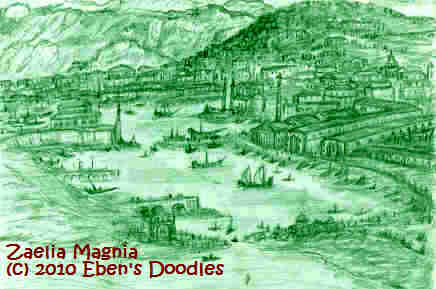
Thinking that he could do worse further up the coast where the barbarians had spread havoc and sacked cities, Rutilius went ashore with the boys, followed by the father and his two bodyguards. While the father went to see about the pepper business in the spice market (such as it was there), the bodyguards stood watch, seeing to it that no ruffians disturbed them by asking for money or trying to sell something. Rutilius planned to and read them some of his elegy, his swanson for Roma, amidst a proper setting-- the cramped, wooden, somewhat smelly and ratty old grain trade ship being no sort of place for such a reading!
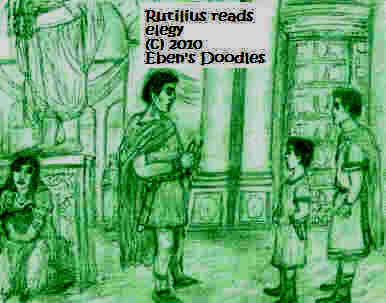
As he looked for just the right place to stand and do his reading, he grew vaguely aware of the rather decayed atmosphere that hung about Zaelia Magnia. No doubt it had been a very thriving place until lately, he could tell from the size and decoration of building, many of them which were more elegant than most provincial cities could boast. But the markets he could see at a glance were sparse of both shops and patrons even though it should be a busy marketday, with country people crowding in from the farms and villages round about. It didn't help the looks either--those long, sagging lines of graying laundry strung apartment house to apartment house, left there by panicky people who had abandoned the city and fled south with whatever household goods they could cram into wagons. A woman nearby was holding her fussing, colicky baby. What was she doing there, waiting for someone to come and take her south too? She was squatting indecorously at the base of a statue of Stilicho, the imperial commander-in-chief and would-be emperor he resented more than any other Roman general, since, half-Vandal or Lugian that he was in blood, he was so sympathetic to barbarians. He had let far too many coarse, evil-smelling barbarians into Roman lands, Alaric the Goth being the most dangerous of the lot, to serve him or at least be his allies against the most noble Roman families, most of whom could never accept him as Emperor however brilliantly he campaigned with the army, crushing one barbarian horde after another that threatened Italia and Roma.
Statue of Stilicho nothwithstanding, this city would have to do, as he saw no barbarians had gone through here as yet, and there remained at least the appearance that Imperial Roma was in charge and would always be. With Italia's roads in turmoil and a chaos of brigands and refugees and far too few police, and whole areas of the provinces in the north overrun by barbarians, he had to be satisfied with that much--and ignore the woman and child as best he could!
Realizing he couldn't hold the boys' attention for very long, he selected only about a dozen of so lines that he thought best captured the noble spirit of Roma and what she had achieved, and then he chose a spot and stood proudly like a speaker in the Senate giving a speech, his head and shoulders thrown back and his feet firmly planted.
"O Roma!
Listen, fairest queen in all the world.
You are welcomed among the stars of heaven, mother of men
And mother of the gods.
to you we sing praise
And ever shall.
So long as the fates allow,
None can be wholly forgetful of you. Your works
Spread wide as the rays of the sun where curving ocean
Surrounds the world.
Africa has not set you back, with its scorching sands,
Nor the northern climes repulsed you, with its cold;
As far as living nature has stretched toward the poles
So far has earth
Proved accessible to your valor.
You have, O Roma, given the world
A single fatherland;
Even the unjust have found it profitable
To be taken under your dominion.
By offering the vanquished partnership in your own laws
You have made a city
Of once was once the world..."
He thought they looked a bit disappointed with his verses, and he was right. It really was unsuitable, and the boys were far too young and uncultivated to appreciate his fine sentiments.
"You think it too dull a subject for boys, is that it?" he asked them, somewhat annoyed at them for wasting his valuable time. "Well, then, what other things do you want to hear me tell about? We might as well not waste our outing."
The youngest boy, Honorius Ubanus as his father introduced him, who proved the brightest witted of the pair despite being a Briton with an accent, spoke up.
"Sir, that was good, very good. But do you have anything more, about the orphans Romulus and Remus and the she-wolf their mother? We'd love to hear about them if we could. We don't want you to quit now."
"But that story is just old wives' tales and nonsense, everybody knows that!" Rutilius scoffed, not accepting the Honorius's clumsy flattery. The boys' faces sank, so he quickly added, "But I have something far better. I have just recently returned from a trip to the imperial libraries and archives in Roma, and I turned up some things you might find most interesting..."
He didn't tell them how bitterly disappointed he was there on his latest visit. He had gone specifically to research the Sibylline oracles concerning Roma's destiny and fate. The Archives were in an uproar. The distraught librarians rushed to tell him everything. He found that Stilicho, just the day before, had sent troops, Roman-armored barbarians, and confiscated all the Sibylline Oracles and had them burnt. The loss was irreparable. The votaresses of Apollo had no other copies but these, put in the Imperials for safe-keeping in perpetuum. No commander, no emperor, no Senate decree, could overturn the ancient rules governing them--they were to be kept inviolate forever, and anyone who disturbed them in anyway incurred the wrath of the gods, in a thousand curses all carved in stone on a wall. Now they were ashes! The visions and prophecies of the Sibyl were gone forever, like the smoke of the incense that wafted up into the rafters above the tall Corinthian pillars! The priests who attended the holy books had tried to stop the desecrators, even at the cost of being slain if that was their fate. But they were dragged aside and some even beaten who blocked the door to the collection, which was the chief treasure of Roma.
This was the greatest outrage ever witnessed there, indeed, since the time of the first Gothic invasion and capture of Roma centuries before the imperial era. Why had he committed this wanton act of destruction of Roma's most valuable, sacred records and relics? Some said the ecstatic prophecies of the Cumaean Sibyl spoke too pointedly of events and even particular persons in his own administration. Hearing some quotations from the Sibyl was enough to frighten and enrage Stilicho, whose position in Roma among the best families was already tenuous, so he struck at the Archives and wiped out any suggestion he was a monster tearing down the realm by deferring to barbarians over the safety and welfare of Roma. How dare a priestess of Apollo of bygone days name him and his men? He silenced her voice.
Deprived so brutally of this primary source, Rutilius had no choice but to consult secondary sources for whatever visions and prophecies he might find, in hopes of finding enough material to write the destiny and future what he sought. Thank the gods, there were plenty secondary sources that the barbarian-fathered Stilicho didn't bother to molest!
The great Historian of Roma, Tacitus, another historian of note, Livy, Pliny the Younger, Suetonius, not to mention Thallus, Phlegon, and Lucius. All mentioned the crucifixion. Lucien the Greek historian told of the death of Jesus, writing, "The Christians continue to worship this great man who was crucified in Palestine because he brought a new religion to the world."
He of course could find their writings voluminously collected in the Archives. And then there was a Jewish historian, Josephus, too, who wrote concerning Pilatus Pontius's procuratorship in Judea, "Now, there was about this time Jesus, a wise man, if it be lawful to call him a man, for he was a doer of wonderful works--a teacher of such men as receive the truth with pleasure. He drew over to him both many of the Jews, and many of the Gentiles. He was the Christ; and when Pilatus, at the suggestion of the principal men amongst us, had condemned him tot he cross, those that loved him at the first did not forsake him, for he appeared to them alive again the third day, as the divine prophets had foretold these and ten thousand other wonderful things oncerning him; and the tribe of Christians, so named from him, are not extinct at this day."
And, being a former capital governor and secretary of state as well, he also was free to consult the whole mass of the the Imperial State Annals which included the recorded Senate proceedings, speeches, and acts along with the imperial edicts for the last six hundred years in great detail. There was no duller reading than the records of the Senate, it was commonly believed. But who had ever taken the time to really find out if that was true? Few, indeed! Having thought these would be mainly tedious, business-like accounts as others had characterized them, he found their view was mistaken.
Despite his grief over the burning of the Sibylline oracles, his readings of the imperial and Senate records turned up many curious things about Jesus the Messiah of the Jews.
He could tell the boys about them, too, for some of the Annals described gods that visited Roma in its earliest days, gods that came in flying ships all the way from the stars, it was reported. They used, not sails for propulsion, but powerful crystals that produced far greater speed. Were they Jupiter and the gods of Olympus? They did not call Olympus their home, rather they had a name for it the Greek philosopher Plato had also used: "Atlantis." Wasn't that a lost continent, a motherland of civilization, that had sunk and been utterly destroyed in ages past? Yet if these divine beings had come from there, it couldn't all have been destroyed. Where could he find more light on these beings and their powerful crystals? he wondered, and so he had plunged further into the Annals of Roma, exploring the earliest ones in tier after tier, climbing up and down the gilded ladders to obtain the ancient scrolls, as well as searching the ones written around the time of the gods last appearing, in the reign of Tiberius. That was the same reign when the Jewish claimant-king called the Christos challenged Roma's authority to Jerusalem and all Judaea, and for that he was crucified by the procurator, Pilatus Pontius, only to be found missing from his tomb, which his followers explained was evidence that he had risen from the dead!
Of course, the emperor, receiving the reports of this, was greatly disturbed (and Herod and the Jewish authorities too). Pilatus was recalled, for he had made such a mess of things, he couldn't be endured. He was sent off to Gaul, exiled, but satisfied everybody by committing suicide like a dutiful Roman should who has outlived his usefulness.
But all that was of no interest to mere boys, of course. Once he mentioned the flying boats from the stars, leaving that subject and continuing on to the reign of Tiberius where Christos was crucified, he could see the boys were growing glassy-eyed. So he turned back to the star ships of the Titans, for such the gods clearly were, not the Olympians after all. They said they, not the Olympians named to them, were ruling the earth, or had resided upon and ruled it once upon a time. As for Jupiter and his court, they said they had been overthrown as usurpers, and they were the rightful holders of the throne and its powers. The boys then hung on his words as he told them all about the various things the Titans did while visiting the earth in Tiberius's reign, and saw the boys' mouths hang open breathlessly, so he was very much amused. Their little outing from the tedium of the ship was proving worth the effort after all!
"Did you learn where the gods went after they departed from here, sir?" Honorius asked, as if he sensed that Rutilius had more to offer. "Where is it they live if it isn't Mt. Olympus?"
Yes, he had learned that too, in fact. But he hardly cared about the Titans now, as this had happened long ago, and it was the Christ and his crucifixion and his reputed resurrection that stuck in his mind, and which he could not get rid of. How could he communicate these things to mere boys? They were too private, he felt, as they touched upon certain questions of the soul and its destiny in the after-life, if there was was, that is. This matter of Christos rising from the dead reputedly--even Tiberius believed he had risen after it was reported, meticulously, to him! It was incredible but true, for he had it in the Emperor's own recorded statements and diary. Well, then he was forced to settle in his own mind whether such a thing could really happen. For then it would change absolutely everything! And if this preposterous Jesus of Nazareth was truly what he claimed to be--Son of God, ONLY SON OF GOD, that is, displacing all the Caesars who claimed the same thing--and truly rose from the dead, well, the whole world was turned upside down!
Everything else was mere information: Did Christos really work the stupendous miracles--healing lepers, giving sight to the blind, even raising dead people back to life--that were claimed? Every authority of note in the case attested to their validity. Even his chief enemies--the religious leaders of his own people--accepted these miracles as true events. Nobody had any grounds for questioning them, nor could they, as they were all done so publicly, and countless people were living at the time who witnessed them and were available to attest to them to everybody who asked in courts of law--and did, in fact, ask. So it wasn't the miracles that were germaine to his investigation, it had to be the "Resurrection," which was what the Jews called it.
Nevertheless, Rutilius did speak a bit about the miracles performed by the Christos in Judaea and elsewhere, while avoiding his own feelings and soul-searchings on the subject. His own religion, believing in the gods of Roma, was notoriously sparse in miracle-working gods who walked among men as the Christos was reported to do. He couldn't help that or change that, and so he felt it was best left without discussion. But Honorius, fortunately, was not asking about the gods of Roma and their behavior, which was rather morally questionable, to say the least. Honorius seemed to be just as interested in the details he gave them about the records dealing with Christos' life and miracles.
But then Honorius, like any boy who is too frank with his elders, asked him with childish candor, striking at the heart of the matter: "Don't you believe he rose from the grave, sir? Everybody knows he was crucified, so he had to have died, not just stepped off the stake, and nobody could do that after what they did to him. And then it had to be a real rising from the dead, or all those witnesses were liars and everybody at the time would have said so and hauled them into court and had them punished, right?"
The boy from the provinces was bright for his age, indeed! Perhaps, too bright! thought Rutilius. He hadn't encountered such probing and highly personal questions from noble Roman youth twice his age!
Yet in other respects, he was quite ordinary, being fascinated with the the exciting tale from the Annals of Roma concerning the gods' visit to Roma in ships that could streak through the sky fast as thunderbolt. So he sought to divert him if he could.
When he exhausted this information, however, the boy abruptly shifted back to Christos. Rutilius found himself forced up against a wall by this question, and he actually began to sweat! Again, Honorius put his question to him. "Don't you believe, sir, that Christos rose from the grave? That would change a lot of things in the world, wouldn't it?"
Since he couldn't put the boy off this particular sticking point, he ended the session abruptly and offered to draw the gods' flying ship if he could find a piece of parchment.
Honorius was excited, and so was his friend, and said no more about Christos. So Rutilius, heaving a sigh of relief, looked round for a source of parchment or writing paper, and found a shop selling books. Only the owner had recently pulled out of the business, leaving the door ajar, without even a lock to keep thieves from ransacking what was left inside.
They went in and found the racks virtually empty of books, and yet there were a few old discards, with some pages in them he might use for the purpose. One was a detailed account of the banquets of Nero and Elagabulus, listed with all their enormous menus and recipes! What senseless, vulgar extravagance! One banquet listed a meal started off with the appetizer, 400 brains of nightengales in a mint sauce with contained peas coated with gold! Then there were so many roses cascading upon the guests, that four guests actually suffocated.
Yet another was a poetical work by Commodus, the poetaster and degenerate son of Marcus Aurelius the Philosopher-emperor, praising himself as a god in the most fatuous way. Rutilius dropped this book into a litter of trash on the floor, which it deserved--as this emperor was the cause of the decline of the empire beyond any other bad ruler they had had.
He had read Dio Cassius who had written, "Commodus was a greater plague to the Romans than any pestilence or crime. He wanted to change the name of Roma and call it 'Commodiana' after himself. A statue of gold weighing a thousand pounds representing himself in combat with a bull was cast. He entered the arena to fight gladiators; he was armed with a sword and they only with a woman's wooden weaving batten. He surpassed all others in lust, greed, and cruelty; he kept faith with no one."
And, Rutilius thought, monstrous Commodus met a fitting end. A wrestler whom he had wounded throttled him in his bath!
Finding a more suitable book, that dealt with agrarian matters, he spread it upon the table, found an open space and with a piece of charcoal Honorius picked up in the adjoining room, used to make a warming fire in a brazier, Rutilius sketched the flying ship.
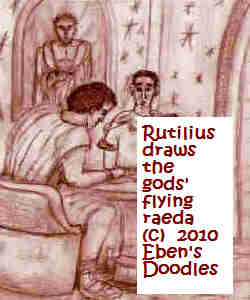
"How does it fly?" "What is its power to fly, sir?" How fast does it go through the sky?" "How did they make it?" "How many gods can ride it at one time?" "Is this the only sky-carriage they have, or do more of them?" "They look like saucers, sir, only they are flying saucers! Do they fight barbarians with these flying saucers?" "Could we ask them to loan us one to fight the barbarians and drive them back to their dens?"
Honorius was literally brimming over with questions, while his friend stood by with wide eyes like a dolt, and Rutilius tried to answer Honorius as best he could, based on his readings of the Annals dealing with the subject. When he finished, he signed his modest effort and handed the entire book to Honorius, who seemed overwhelmed that he should be given it as he stood gazing at it.

Pleased that he had given the boys such a good outing so far, Rutilius next bought the boys each a bag of nice sweet candy. They were fortunate the candy maker was still in town.
While boys were enjoying their marzipan cakes from a Syrian confectioner, Rutilius left the bodyguards to watch over the boys. The captain had still not sent anyone to call them to board, so he knew he had time to look around a bit more, and so he looked in at a jeweler's, Terencio's by name.
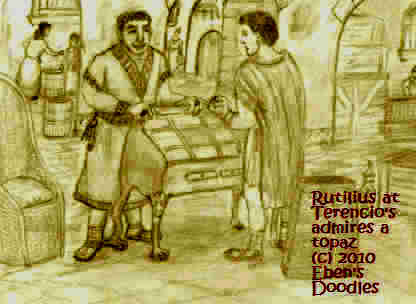
He was examining some topazes from India's largest island on the southern tip of the peninsula. Very large and gleaming like lion's eyes, he couldn't resist making an offer for them. He had lately seen the best jewels that Roma's jewelers had to offer, but these surpassed them.
"What arrangements can I make with you if I should be interested in these four?" he asked, keeping his voice devoid of the excitement he felt.
The jeweler was busy with his wife, son, and daughter were packing dozens of valuable things away into cloth-lined boxes and big wicker baskets, and he turned to the patrician, bowing.
"For you, sir, since we need to dispose of everything we can now, any setting you prefer--for only the price of the jem." "Oh, how about a man's ring in white gold, then a matching one in red gold, and the third can be set as the ornament with ebony on a nice gold chain of small links only for a lady's neck, and I wish the fourth to go in a setting of sapphires in gold for a man's fibula. Is that too much to ask?"
Terencio bowed even lower. "Certainly not! I have all I need to do it. My craftsman is the finest who handles the settings. But there is the matter of the, er, payment, sir."
Rutilius started off with a ridiculously low amount.
The jeweler did not even flinch, much less laugh. "Excellent! They are yours, sir! Can you wait for them, they will be ready in a few days, or should I have them sent by special courier to your residence? Where might that be, sir, for I perceive by your speech you are not from this city and are travelling?"
Rutilius told the man who he was, that he was a native of southern Gaul, and there was the problem that, as he was in transit, traveling by ship because the roads were overrun by barbarians, a courier would not be good enough, he would be captured and robbed on the way.
"So to make sure I receive the full consignment of jewelry I am paying for," he told Terencio, "I will gave instructions to a tabellarius escorted by an armed guard that I will send to your shop for the jewelry, and only then will the full payment be turned over. They will be sent to you by ship, so there will be no problem of being accosted on the roads. Agreed?"
This being said, and agreed to by Terencio, Rutilius was still so amazed by the low price he was paying, he had to inquire, even at the risk of the price being raised.
"How is it that so fine a set can be, ah, so modest in price? I have seen what Roma and Ravenna have to offer, and these are just as good, indeed, they surpass the capital's, and yet you ask less. How can that be? Are they truly genuine? I won't be fooled by glass fakes, either for that matter, for I will have them inspected if I have the slightest suspicion about them, and you will have to bear the consequences of defrauding a public official."
Terencio smiled and scraped, fervently assuring Rutilius that the jewels were all they appeared to be. "My reputation is a most established, excellent one, ask anyone around here, as my family has sold fine jewels and jewelry for generations, and I am only leaving..."
"Leaving?" Rutilius interrupted, his tone growing icy cold. "What do you mean by that? Have you given leave of your senses, man? Here you not just agreed to set the stones and to await payment, yet you speak of leaving? What is this all about, shopkeeper? You know the laws of Diocletian are still binding, those concerning your guild, do you not? Surely, you aren't considering fleeing into the mountains and joining vagabonds and robbers? I am empowered to arrest fugitives, and confiscate their possessions too. Surely, you aren't considering leaving your lawful work?"
The shopkeeper paled, bowing, and his brow and cheeks glistened with visible moisture.
"Yes, indeed, sir, I know the sacred laws, but I paid highly for my official permit of release from the Consul in Mediolanum for health reasons, which you can examine if you like. My health has been most badly affected, my bowels are slack, as I worry myself sick day and night how I--and though I love my country as much as anybody I can't afford to remain here a moment longer than I must, since the trade is so greatly diminished in these parts since..."
Rutilius sighed. "But what about our agreement? Aren't you going to honor it, or not?" "Yes, sir! I plan to send my wife and family and goods on ahead, with protection of course, and finish the remaining business I have here, selling the shop and house and several vineyards and a tabernae I have too if I can find buyers, and surely that will take several weeks. You will be able to contact me in that time, will you not?"
"Of course! If not, you shall know I have contacts, so just leave your address and I shall find you and pay you everything you are owed, and we shall conclude the business satisfactorily."
Then they returned to the subject that weighed heavily on both their minds.
"Oh, the barbarians, the barbarians!" sighed Rutilius, shaking his head. "All these odious tribes of unwashed, greedy, violence-loving Goths who constantly pour across our borders looking for the gods know what! They are tearing apart the whole realm, thanks to certain parties among us who seek their own interests and gain over Roma's security and are opening the gates everywhere you look!"
"Yes, indeed, they are ruining everything here in the Western Empire!" the jeweller agreed. "Some people claim they come to do honest work we Romans won't dirty our hands to do--but that isn't true, they are taking the jobs we find so rare these days, and our people are left without work, with these barbarians seizing everything for themselves and sending our Roman gold back to their families across the borders! But I hear things continue still very good over in the Eastern Empire, in Alexandria, Antioch, and Constantine's City particularly, and so we will be going over there, probably to Alexandria, since the ships dealing with the rich India trade touch there first on return. We have only to find a ship, for I hear they are few these days and are very expensive to board. The rates and charges for baggage are extortionate, which is why I must reduce my stock drastically. If a captain should inspect my baggage and find so many jewels, he would demand half of it for me to board, and I would have to give it! Yet I plan to open a new and even bigger shop than we have here on the street in Alexandria they call Golden Mile. We will sew the some of our money into our clothes and also buy letters of credit in the banks of Roma and buy new stones in Alexandria when I arrive there, where they will be cheaper too! If you see anything else you like, the price will be most reasonable!"
Rutilius relented, turning more graciously to the bowing, flustered shopkeeper.
"I am sorry to see you have to forsake the fatherland," Rutilius said, though he no longer thought of this man as a true countryman, since he was running away and not going to deal with the barbarian menace. "What if we all did as this fellow?" Rutilius thought. Yet there was no need to question it, he was going bankrupt in this declining city, no doubt. Best he sell out quickly, even at a loss, and set up new in a better, safer city as far away as he could get from Radagaesus, and now Alaric and his hordes! Who could blame him for wanting to leave as soon as possible, if there really was no future anymore for him and his family and business in that place?
They exchanged some small talk, though the patrician Rutilius was not particularly fond of small talk with inferiors, then Rutilius noticed the two boys had finished their treats and were chasing round Stilicho's statue and making a public spectacle, and he saw it was time to go. His four retainers escorting them, they returned to the ship, and the voyage resumed to southwestern Gaul.
They no sooner returned to the ship then the father of the youngest boy Honorius thanked him for enlightening his son on the greatness of Roma.
Rutilius bowed to the older man. "I tried to do the greatness of Roma honor, sir, and hope it made some lasting impression on the boys."
Rufus Urbanus eyed his son closely, and Honorius had something to say. "What is it, son?" his father said. "We had a great time, pater. He told us some wonderful things, all about Christos and the flying..."
The father turned to Rutilius, brows lifted.
Rutilius groaned inwardly. No, no! he thought. Now he would have to explain everything to the father.
He quickly tried to assure the father that it really wasn't so wild and exciting as all that.
"The boy is overstating what I said to a degree, sir. You see, I was in Roma just before I set sail for our family estates at Nabo Martius, and did research in the State Annals and found some curious things, that is all, which I mentioned to the boys to amuse them if possible after I finished the reading of my poem."
Rufus's brows lifted further. "Oh? What curious things? Could you tell me also? I would be most interested to hear about them.
Since Rutilius did not think this talk between adults would be suitable for boys and they wouldn't understand most of it, he took the older man aside, and they discussed certain matters and questions with him. Since he was dealing with a man of experience and maturity, he could go into much deeper detail when relating what he learned from the Archives about Tiberius and his dealing with Jesus the Nazarene.
Even though Rutilius Claudius Numantianus knew he was dealing with a Christian, and the gentleman had a Christian's perspective on things, there were broad areas where they could talk with mutual understanding, since the two of them were Roman or at least debtors to Roma, its great learning and, philosphy, and its grand heritage. They both deeply cared for Roma's legacy and its welfare and maintenance as the lone civilization standing against the darkness and anarchy of the barbarian world.
Approaching Massillia, with a stiff headwind, the oars had to be used, and then they made slow progress into the harbor. An outbound ship came to their attention before they even saw it clearly. The smell gave it away. A slave ship bound for the marts of Malta and Africa, it carried its cargo of souls in the most foul conditions that no Roman gentleman would have countenanced, but it was something that they could not change--slavery was immemorial, and would always be practiced as long as the strong ruled over the weak and certain men aimed to make a profit in human traffiking. They themselves had many slaves, but always aimed to make their lot as bearable as possible. Roma was built upon slave labor, and it was unthinkable that Roma could exist without their cheap labor.
Honorius was standing by himself and saw the slaveship, and a rain squall caught them just as it was coming in view.
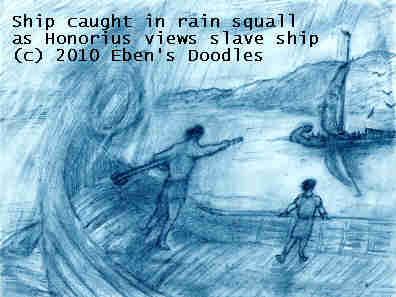
The ship was going no further west, the captain informed Rutilius and the other passengers en route, due to the depredations of the barbarians. They were obliged to find other means to get to Narbo Martius and other points in southern Gaul and in Hispania.
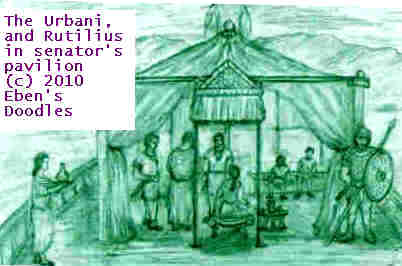
Rutilius went ashore, after giving his last regards to the senator and his wife, who were now transferring to a private ship to take them to the Sardinia where they had extensive estates. Forewarned by the captain that the roads were difficult to impassable from Massilia to Narbo Martius his destination, he thought of finding another coastal vessel if possible to avoid the barbarians disrupting the roads. Surely, he thought, Massilia was a big enough port to supply a ship going his way.
He went to the Forum first, where all formal business was conducted, the best place to receive the latest news.
The slave mart was hard by, of course, and his eye was taken by some slaves newly arrived. He had plenty slaves on his estates, but he was always on the lookout for younger ones who were sound of body and mind. These looked good enough for his uses, so he went closer to see if any might prove suitable. He thought he might purchase one or two, if the price seemed fair enough, and take them along with him to his estates, which were always in need of fresh stock of that kind.
His eye fell on three, and then when reading their tituli, his eyes widened with disbelief. They were all three from Narbo Martius-- but that wasn't all. He inquired immediately of the trader, and he said he had gotten them from the barbarian horde passing through that district.
Feeling somewhat afraid of what he might learn, Rutilius decided to ask the slaves themselves who they were and where they had lived at the time of their capture.
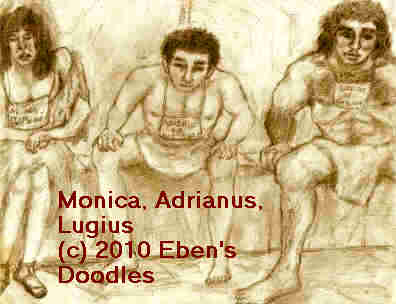
Since he was too exalted to address a slave in the market, Rutilius had the trader act as his intermediary. "Where are you from precisely?" the trader demanded from the first.
"The household of Governor Lonchonius," the youth replied.
"And you?" the trader continued, turning to the bigger fellow. "The cattle yard on the estate of Governor Lonchonius," he replied. "And you!" he finished with the woman. "The household, I was a maid in the house of the Governor," she said.
Rutilius was beside himself. He did not know what to say. These were his slaves, on sale in this public mart! Stolen from the estates of his father and himself! What an outrage!
His mind whirled. He could go get a bailiff and confiscate these "stolen properties" immediately, but that would take some time, with the proper records being filed at the court, etc., and local officials would have to be present to ratify the seizure. All this bother--and he had so little time if he were to find and hire a vessel to take him the remaining distance to Narbo Martius.
But what would he find once he got there? If his estates had been overrun, weren't the residences and outbuildings all burnt and their valuables all seized and carried off by the barbarians? He had to find out at once.
Too anxious to get the news, he forgot his manners and dignity and interviewed the slaves directly, something unheard of.
"I will have you lashed if you are lying to me. Again, are you three the property of Lonchonius the Governor of Roma and Ravenna? Say!"
All three declared they were, and the trader grinned, exposing big gaps between his teeth. "They speak the truth, sir, look what fine-bodied slaves they are too--the barbarians were good to let me have them, so they could be restored to you--at a certain fair price of course, for I already paid for them with my good money, sire!"
"Yes, yes! You shall have your money. But I must have what they know first."
He turned back to the slaves. "What about the estates? What do you know happened to them? Are they unharmed?"
The youth shook his head. "They burned everything to the ground, sire."
Rutilius's face took on a sickly hue, like ash from a dead fire. He went over to lean against a pedestal without a statue (knocked down by some barbarian perhaps), and pondered the disasters to his family and fortune. He gave orders to his attendant to pay the trader for the slaves, then get a writ from the prefect setting them free, and handed him some money to put in their hands to see them back to wherever they might still have homes and relatives. That was all he could do, as he wouldn't put them on any of his cattle ranches south of Roma, not after what they had experienced. They would frighten the other slaves into running away if they told what had happened up north.
Just as he finished this business with his attendant, his eye alighted on another slave, more fair, a barbarian from the north eastern tribal nations evidently.
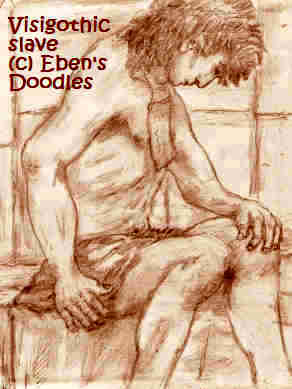
He went over to examine the titilus, and he was right--this was a captured Lugi, the worst of the tribes attacking and invading the empire. How did he fall into Roman hands? It hardly mattered, not for him anyway. He was going to the quarries no doubt for his remaining savage, hellish existence, thrust deep under the ground in hot tunnels to hack at the rock with an ax and shovel up the ore into baskets to be carried by other slaves up to the surface he would never see again. No wonder the slave looked so downcast--he sensed his doom and had lost all hope!
Just then Rutilius felt a surge of feeling for the barbarian savage. Why? He had no reason to feel any such thing. After all, this man and his race were destroying the empire, ransacking and burning his own estates that were the flower of Gallia. He deserved every bit of the hell he was going to experience very soon now after he was bought and transported with a hundred others like him to the Spanish or North African mines. Yet he felt the same powerful feeling he would feel for a brother! He couldn't resist it.
He turned to his attendant. "Buy him also. But I don't want him in my employ! Free him also, and send him on his way. I don't want to see him ever again!"
He turned away, more disgusted at himself than at the Lugian. How could he treat such an animal with compassion? It was utterly wasted! He might as well try to tame a brute lion or boar than this creature of violence and destruction!
Rutilius went to a place aside from the busy market where he was a bit more alone, where he tried to clear his mind enough to think clearly what to do next.
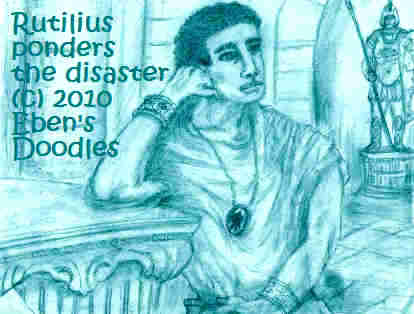
With the roads in chaos, with no doubt brigands preying upon all who yet ventured to pass on them, and his estates burnt, what was there worth visiting? His whole trip was jeopardized. Perhaps they could be rebuilt, but without Roman law and order restored in the region, the effort would be useless. Was Narbo Martius yet another district and city Roma was abandoning to barbarism?
He had to make sure--that it really was as bad as reported. He decided he could find out, not just depend on people's word, but the evidence of his own eyes. The condition of the road, the Via Aurelia, would tell him all he needed to know one way or the other.
He went to hire a conveyance and found all manner of carriages, from raedas and caraccas to sedan chairs. There was a great variety, he found. The proprieter told him that the previous owners were glad to get rid of them, since they were leaving their estates for good and wouldn't need them anymore. Some needed the money too to get away, since they had lost most everything when the barbarians first swept through and burned many of the villas and sacked the towns and cities as well in many parts of Cisalpine Gaul.
But Rutilius did not need anything elaborate, just a means to get to the main road where he could observe the traffic and tell from that what chance he might have of going westward with reasonable safety.
He could marshall a small army, if he gave himself time to apply for troops, for being a former governor of the imperial capitals, and being the son of Lonchonius, he had access to imperial troops and boyguards. But that took time, and he didn't want to wait.
So he hired a simple sedan chair, and the rental agency provided the slaves to carry him for that day's excursion.
Soon he was on his way out of the city and heading for the main thoroughfare that took the east-west traffic along the coast, the part of the famed Via Aurelia that led along the coasts of southern Gaul and down into Hispania, all the way to Cartegena on the midpoint of the eastern coast.
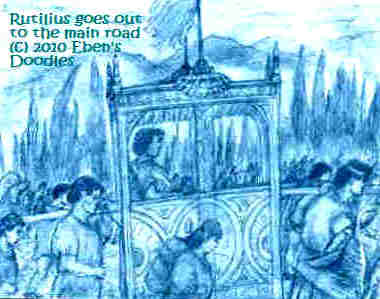
Just a few miles out from Massilia he saw what he had feared--the traffic was like a stampede, a chaotic multitude of pedestrians, wagons, carriages, horses, oxens mostly all heading east and south. His heart sank. How could he make it through such a mob? There was no room on the road, and he would be pushing against the tide of humanity that was fleeing the barbarians and heading toward Roma and other southern points of the peninsula where it was thought there was safety and law and order.
Rutilius gave the order for the chair to be set down, and he got out and stood watching the refugees. Every class was represented. Slaves, nobility, rich and poor-- the entire society of Roman Gaul was in flight! It was the most amazing spectacle. He tried to get someone to pause to give him some news of Narbo Martius and its environs.
But nobody wanted to stop, they only wanted to make it as far from the barbarians as possible in the remaining daylight hours.
Rutilius saw how completely hopeless it was. He would need an army to escort him to Narbo Martius and to his various estates--if he wished to return from there alive, that is. He returned to the chair, sat down, his head in his hands. Then he roused himself, and gave the command to return him to the city. He had seen what he had come for, and it was more than he could bear to look at any longer. Disintegration had set in deep, and the ground was cracking and falling away in huge wedges, all the way toward the heartland of Latium. Obviously, even with Priscus Attalus as "emperor" sitting on the throne in Ravenna, and the dire Flavius Stilicho, magistum militum and the real emperor in the realm except in title, things would not get any better, no matter how many barbarian armies Stilicho hurled back toward the frontiers or bribed off with the last reserves of the imperial treasury.
What should he do? Where should he go? Return to Roma, or go to Ravenna bearing the bad news to his aged father and kill him with it?
Needing to sleep on it before he made any decision, Rutilius had the porters take him to a villa outside Massilia, where the family of a former consul, Secundus Sylvanus Fabio, resided. His father being a patrician and peer of Secundus Fabio, both speaking often and well of each other, he knew he would be most welcome even with no prior notice, if the family were in residence, that is, and not seeking rest or recreation at their various other villas in the south of Italia and elsewhere. As for the Urbanii, they would have to chance it if they continued on to Narbo Martius, he thought. He could only send word back by courier and warn them of the real risks, and advise them to seek some other route back to Britannica, by ship, not by land if they could find a ship. As for himself, he couldn't go home. He would send an agent in his place, who wouldn't be so conspicuous as the former governor of the Capital coming in state with bodyguards.
His ancestral home and estate no longer existed, thanks to Stilicho's policies admitting so many of the rapacious Gothic barbarians into his home province--only for them to break treaty and destroy everything in sight like bulls set loose in a pottery shop!
What a scene he had just witnessed out on the Via Aurelia! It gave him the chills. Carts losing a wheel or the wheel broken from being run too long and hard on the roads, their goods tumbling onto the roadstead, then masses of wagons and people and horses rolling right over the poor owner's possessions, even trampling him as he sought to keep his possesions from being destroyed!
Rutilius could do nothing for such wretches. No doubt that had happened to hundreds, as the stampede continued, drawing tens of thousands of frantic people to the roads, all trying to get out at the same time if they could.
Roma was literally falling apart before his eyes! he thought. He had not dreamed he would see it in his lifetime, as Roma had the greatest power and an invincible army and used to have the funds to put legions into the field against anybody who dared to defy the empire. But now the treasury was virtually drained, and so there wasn't the money to fund the legions or keep them where theyt were stationed to hold the borders against all the barbarians pressing against them. Yes, Roma was never able to match man to man the numbers of barbarians, but it didn't need to. Roma's reputation terrorized the barbarians and that terror kept them out and at bay, until recently that is! When they Goths and other savage tribes heard that Roma's leaders were at last losing their grip, unable to field a legion or more against them, well, they started flooding over the borders in Gallia, Hispania, and Africa--and once the barbarians lost their fear of Roman reprisal, it was all over, even though Stilicho still won battles against them when he could catch a mass of them together organized in an army.
Carried to the Senator Fabio's estate, Rutilius came to the gate, and his credentials were clear enough to the guards, which were the abominable Goths again hired as mercenaries for such needed posts--would he ever be able to see Romans or Italians again in such positions? It disgusted him no end that even the Senator would hire them, but he thought maybe there was no Italians or even Syrians or Britons available and he had to turn to the huge masses of barbarians who gave Roma so much manpower nowadays.
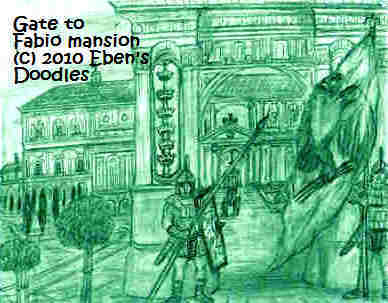
At the entrance, he got down and was escorted by family servants into the hall, and there he waited, and presently word came to him to proceed to his suite of rooms that the wife of the Senator had opened for him. She sent a note, that she would be seeing him as soon as he was refreshed in his quarters, as she had some important things to convey to him, as the Senator was not disposed to admit guests at that time of day, being ill and keeping to his bed.
"Ill?" Rutilius thought, as he was led to his rooms on the second floor. "Was the Senator so indisposed that he couldn't be seen at all? This jeopardized his plans, and perhaps he might have forget about a restful interlude at Fabio's and strike out at once to Ravenna to see his father, without giving him time to send any letters to him, breaking the bad news more gently about their Gallic estates after he had time to compose what he would tell him?
When he had bathed, dressed, and felt much better, he was brought a solid meal served with the estate wines, and every possible need was seen to by the household servants. Only then was the Lady Fulvia announced by a lady attendant. He left his chambers and out of respect for her went out into the hall to see her, and without after nod of her head she turned without a word and led him to a more private spot to speak to him, in a chapel she used, as she was a Christian (which he had heard rumor of in Roma), though her husband the Senator was not, being of Rutilius's beliefs about the gods.
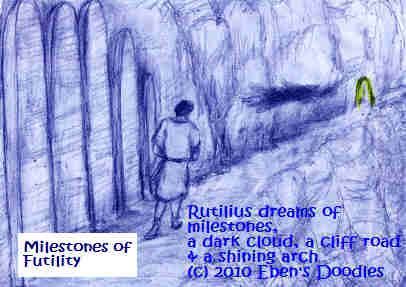



UNCHRONICLE OF THE HEAVENLY RUNEBOOK


How much of you, friend, is Larry Prufrockski, Esquire? The Larry Prufrockskis of the world are everywhere, operating high and low in human society. If they have their way (and it seems they soon shall), humankind would still be contentedly gnawing the gristle off mammoth bones in a dark cave somewhere and sometime in the New Ice Age. This is the fate that is now yawning, promising to engulf all humanity once again, as the world slips back from real diversity into the numbing mediocrity of socialized, equally crystaline ice, ice, ice.
Chronicle of the Unfurled Sail, Unquest of Larry Prufrockski, the Man Who Never Launched, A. S. 1986, Vol. IV, Retrostar
Unchronicle, The Man Who Never Launched, Unchronicle of the Unfurled Sail, The Unquest of Larry Prufrockski, Vol. IV, Retrostar
Unchronicle of the Man Who Never Launched," Part II, Vol. IV, Retrostar
Unchronicle Conclusion, "The Man Who Never Launched," Vol. IV, RETROSTAR

The 22nd Century, the Crystal Age, just before the final crack-up of the infrastructure due to the Greek pandemic, a hitech, nano-cultured disease that attacked the latest state of the art technology and architecture:

In the 23rd Century, Olson and Hodgkins, aboard the Atlantis II dirigible flying from Holland America to the Holy Land, with a stop-off at London, at one point could look straight down at the Bank of England, the treasure chest that held most of the world's gold reserves even while most of the Northern Hemisphere was sinking rapidly back into the Stone Age due to Global Cooling.



For Chronicle Sixty-Two's Unchronicle I, in which Ero flies the Wally-programmed copper dome of the City of Destiny's old Union Train Station to 19th century Chicago just as the Uproarious Hog Butcher of the World erupts in the Great Chicago Fire, and next to the 21st century's dramatic debut with Puppet Master Osama bin Ladin's Muslim terrorists wreaking destruction on the World Trade Center, then a direct hit on the Pentagon, followed by a near take out of the White House, go to Unchronicle I.
CHRONICLE SIXTY-TWO, ANNO STELLAE 10,999, QUEST OF THE CYBERNAUTS
CHRONICLE SIXTY-TWO, PART II, Ero in Never-Never Land
Each ship is allowed three turbo thrusts. To escape the pirates, who were waiting just on the other side of the Clashing Rocks, Captain Pikkard chose his option to escape with only the loss of his tail feathers. The White Ship reappeared in the South Sound, just off Point Defiance, Tacoma, or what was Tacoma in the 1970's before it was hit by a 9.7 killer quake that dropped the whole peninsula and outlying areas into a hole that nearly reached China.
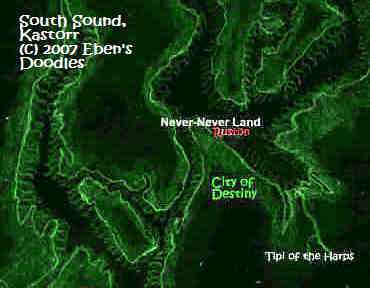
Sent ashore to provision the ship and have a look around, the crew dispersed. Ero went walking along the Ruston village beachfront, which had been a scene of liveliness decades earlier with lumberyards, boat-building, a fising fleet marina, and busy docks lined with ships from all over.
Now it was deserted--as this city was stuck in virtual reality, with scarcely an inhabitant to hold down Fort Nisqually that had been moved up to be the centerpiece of Point Defiance Park. He wandered around in the Park and looked in Never Never Land, which included both Mother Goose Land (a children's area with nursery rhyme characters) and the old, reconstructed fort.
The fort was his first stop. There weren't any Indians or fort soldiers and officers, of course, not even in virtual reality (unless he arrived at the wrong time for a performance of a full-scale attack of Indians on the fort!), so he did not linger long.
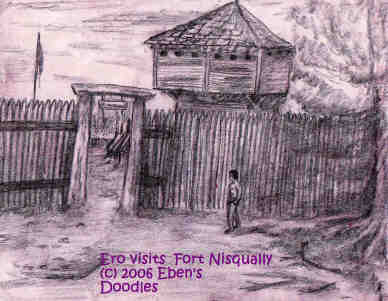
It was Mother Goose Land that was populated with characters he had only read about in his Childcraft Books (even Greek families had their translated versions of the famous nursery tales drawn from England, France, and Germany, and Holland, and his own homeland's Aesop's Tales) when he was a little boy.
He found and turned in at the bookish entrance to Mother Goose's enchanted territory.
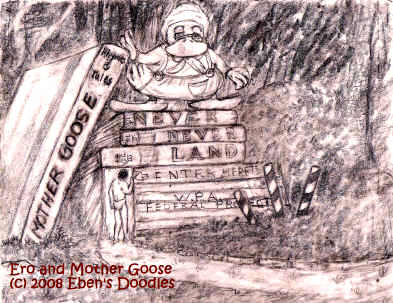
Here he encounters a whole menagerie of Nursery rhyme book characters, which have been altered in some cases by Wally and even passing time and its vagaries. Some were good and worthy, others not so admirable. Crows, spiders, even worse things, moved in early on to the Works Projects Administration brainstorm, and when Wally got ahold of it, it had slightly exceeded expectations already in creating a fantasy children would never forget.
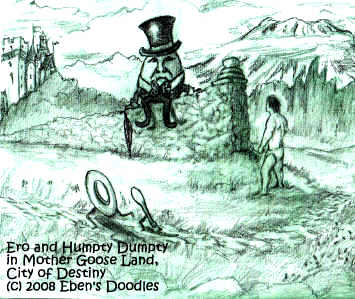

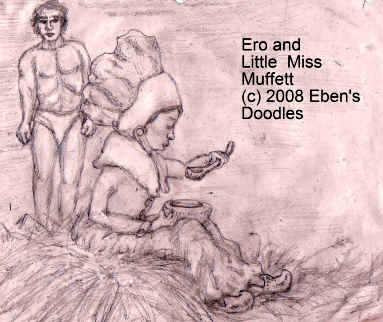
The reason Miss Muffett screams and runs off is apparent by the looks of her uninvited guest, who happened to be a governor of the area, Garry Locke, when it was a state of the country called America. The governor's particularly odious, grasping, blook-sucking character and corrupt administration carried over into cyberspace--just as stains linger long after something dark and indelible is spilled on white linen cloth.
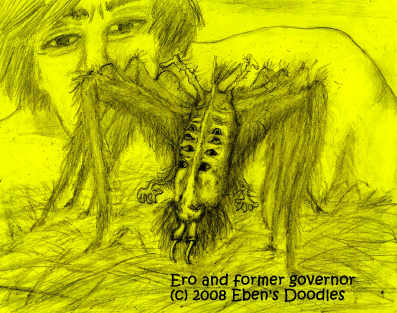
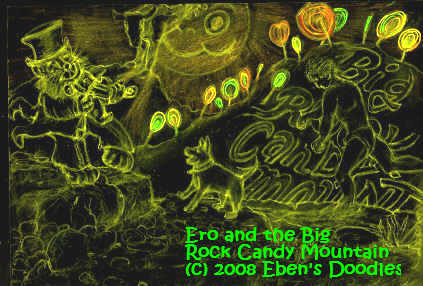
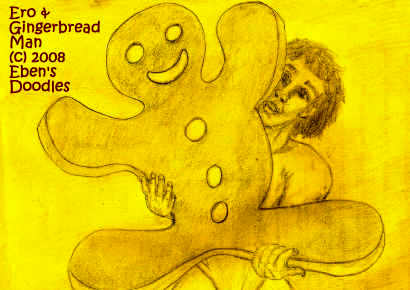
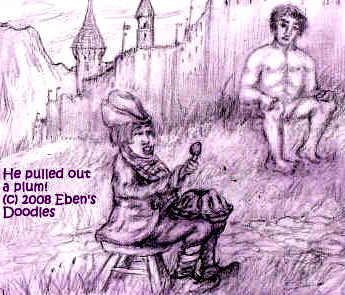
After viewing the conceited little Jack Horner make a pig of himself with his plum pie, Ero walked on and saw how wretched the crows made life for the Gingerbread Man. They literally pecked him to pieces, and by the time Ero got to him, it was too late, he had been completely devoured by the flock.
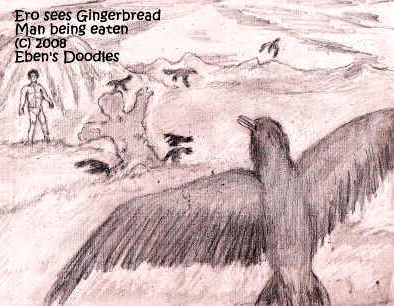
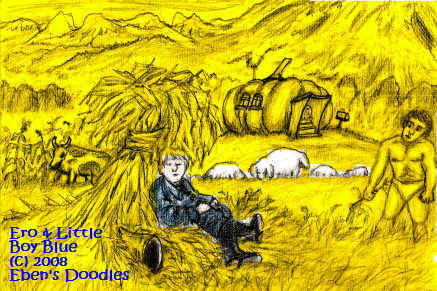
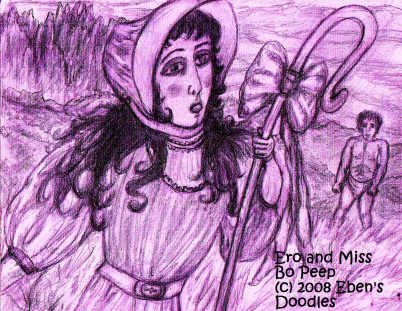
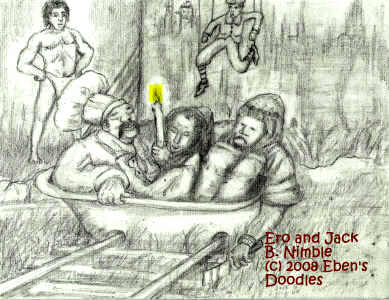
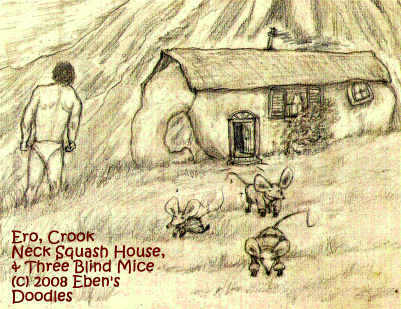
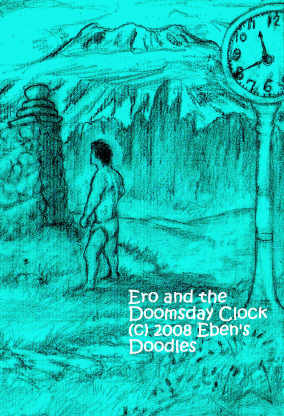


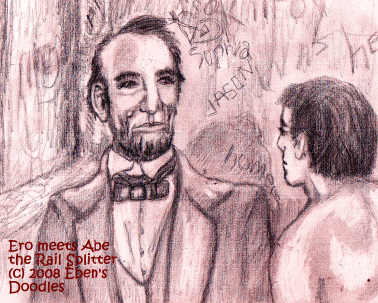
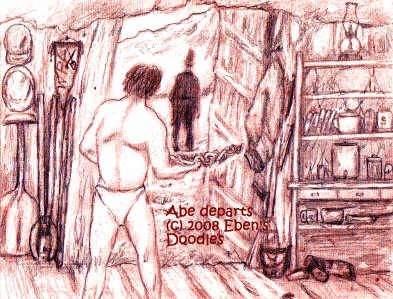
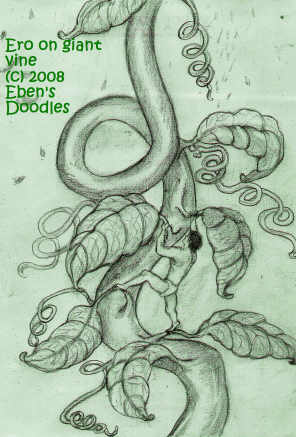
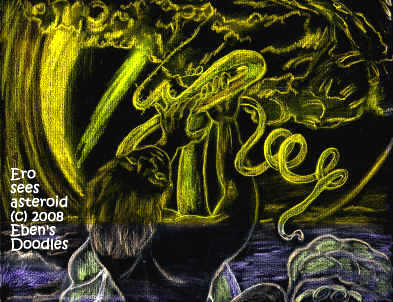

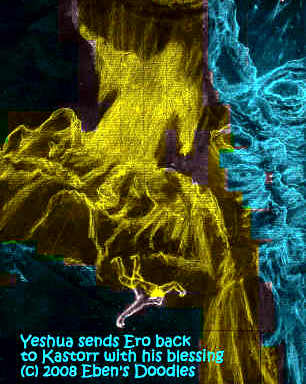

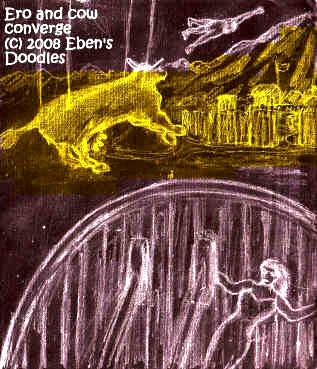
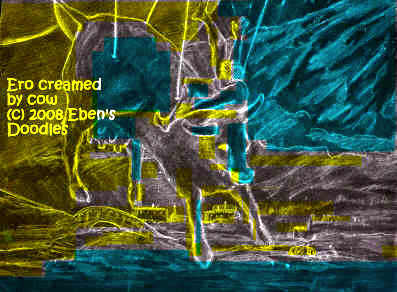

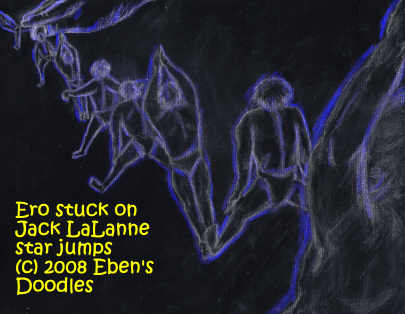

It had been one surprise and adventure after another for him in Never- Never-Land and Mother Goose's colony of oddities. He had much to remember, his meeting with Abraham Lincoln, his climb to the top of the giant beanstock and his flight back to the ground, followed by his disastrous collision with the flying cow and an equally unexpected view of the Red Star, but he never wanted to leave solid ground again!
Loving the feel of the earth beneath his feet, he retraced his path on the steep streets to the waterfront, which suited him more, being a sea-loving Greek.

UNCHRONICLE OF THE MILLENNIAL AGE WORLD WAR IV, A. D. 3002, CONVERGENCE AT Tel Basel

Leaving the fragment of hell that was the Western Front of the Great War, Ero no sooner entered the new photo-file than something streaked blazing and starlike by him, and the mast-bot immediately followed in hot pursuit.

A cosmic Carbuncle, the Vampire-Stone, moved from Earth II to Earth I, as things get too hot for it in its old haunts. The Time Portal serves to give it entrance, as it answers the call, not of distressed cells resident in Marty Yeager, freshly killed and hidden in the forepeak where they kept the anchor chains of the Titanic, but of unbelief and faithlessness residing in the statue of Karl Barth (which contained some timecapsuled papers and writings by the author), the famed theologian of the mid-20th century. Vampire-Stone and Karl Barth, it was a passionate same-sex marriage from the first. These two malevolences were meant for each other. Zeroing in on the emanations from the statue and its nearly decayed but lucite-encased writings, the Vampire-Stone found a habitat it could use as a base for exploiting and overwhelming billions of people during the Millennial Reign of Yeshua.

The Alien Entity invaded Earth II in the dead of night, and no one saw it. But there was an explosion at the point of impact with the surface of Tell Basel, the mound that was all that survived of a once great, thriving, cultured, cosmopolitan Swiss city. The ground was so disturbed that it drew attention, and from the looks of bones of ancient peoples strewn about the crater, it seemed to be a prime site for excavation, and archeologists were called in. What they found soon revolutionized people's knowledge of the world's development. All they had known was the Millennial Reign, but here were evidences that people had lived quite differently, and even served other "gods" or things. And this statue of some great god of the pagan past, it spoke most eloquently even in its cracked, somewhat dissolute condition, of a most civilized culture that held very different values and beliefs than were permitted in the Jerusalem-Centered, Messiah-Ruled Millennial Age. Anthropologists, though they were not called that in the Millennial New World Order, were called in to make what sense they could of the find, and write them down for others to read and talk about. The statue itself of the god was worked on meticulously, so that it wouldn't suffer any more cracking, as it was extremely brittle, liable to shatter into a pile of little pebbles and shards. Slowly, painstakingly, the head and shoulders were unearthed, down to the waist.
What kind of god was he? The titanium-encased writings were found in an exploratory penetration, and they gave a most complete answer, though it was hard for the Millennialists to comprehend, as the concepts were so foreign and new. That it was all written down in a dead language was difficult and slowed the process, so it was good the Millennium was just that: there was a lot of time to spend on such questions, and the researches themselves lived indefinitely, so they weren't impelled by sickness, age, or other considerations, but could and did spend more than a century on the project. Just as slowly, the meanings were deciphered as the entire text was reviewed by many scholars, and then a translation was made that could be shared with the public that was eager to find out about the discovery.

Rowena Plantagenet Llwys-fsyladdamoryayy Gladonneyhhw undid and removed the gold and garnet clasps of her arm bracelets and neck and hair ornaments, then moved up her sleeves to free her arms and wrists so she could work more expansively at her writing table. Working alone as she preferred to do, she need not then be concerned about the opposite sex looking at her bared arms, as men would be apt to do with still young looking unmarried women, she knew from experience. After all, she had to be careful, being only four hundred years old, and her abundant, curley red hair and green eyes hadn't helped either to keep the men away--and leave her in peace to do her work at the site. So she had brought by wagon her own portable office and could be safe there from staring site workmen and many others who wandered up to the site to take a look.
She had been translating the ancient script into her modern Welsh language, spoken over virtually the whole continent formerly called Europa and once divided, in Karl Barth's time, into France, Spain, Britain (U.K.), Germany, etc. Those nations and the godless empire that had bound them together under the Anti-Christ in one last violent effort to overthrow the rule of the Lord God had long ceased to exist, of course, and their names buried and forgotten hundreds of years ago, beginning at the time when the Messiah returned to rule the Earth at His Second Coming.
But Rowena was not thinking of these dead nations or the Anti-Christ and his prophet who had been cast into hell, so much as this remnant of tidy, ancient script before her, speaking of a defunct but once flourishing "Switzerland", a tiny mountainous country that prized its isolation and freedom among the snow and glacier- capped crags once called the Alps. But the ancient wiseman did not spend much time describing the land of the Swiss, though he lived and wrote there for many years, producing his greatest works. He was called by his own people and times a "theologian." Theologians were a special kind of scholar devoted exclusively to the study of holy books and the Bible in particular, both Old and New Testaments. Karl Barth was one such Bible-scholar, and his writings were focused on certain questions he asked and attempted to answer in many volumes on the general theme of how he thought it was best to approach understand the Word of God, called the Bible. The right perspective, in other words, was what he aimed to lay out in detail, in books that numbered 4 million words in total.
Rowena found all of this intense study and highly nuanced and detailed "theological" argumentation so amazing! That they were so rich in those times that certain men could devote all their time and energy to studying the Word of God--when it was readily available to every one in society, being the most disseminated and published book in those early societies. What drove particular men to become life-long Bible scholars? Was it love of the Word of God, coupled with a driving passion to discover all of its riches of meaning and truth?
She saw little such men, or evidence of such a love for the Bible and a desire to inquire into its meaning and truth in the society around her, indeed, as far as she travelled, which was to the world center and Messianic capital, Jerusalem, every year to attend the prescribed Festival and Feast of Tabernacles.
It was regarded as a tiresome duty by most people nowadays she knew to attend the Festival, as they did it only to escape the well-known penalties for not honoring it--poor harvests, scanty rainfall, disease among the flocks and herds, miscarriages among women and animals, etc. Of course, many authorities now explained such things as purely natural things, a sign of the deteriorating natural order under the iron scepter and rule of the world's overlord and king of kings, Yeshua the Messiah. But she wasn't so sure--her parents had instilled in her an old-fashioned reverence for God and the Bible, and even now, as a graduate from a secularist-leaning School of Exhumation (as digging up the ancient pre-Millennial past cultures was called), she tended to handle any artifact relating to the Bible and divinity with trembling in her hands and a certain awe deep in her heart.
She kept such things to herself of course, as she had written her thesis on subhumation in the acceptable secularist mode, without a single reference to God being the origin of life and the center of civilization on earth, whatever names it was called in its various divisions, or "nation states."
What unnerved her, however, and increasingly made her both excited and feeling as if she had stolen and eaten forbidden non-kosher candy, was the unbridled spirit and voice of post-Christian secularism she found in Barth's writings. It was so much like the secularism that dominated her own time and society, that she felt a kinship, a certain identification, with Barth, even though he was definitely of an alien culture and a dead, condemned, anathematized society and nation--one representing a proscribed, fallen, anti-Messiah civilization that met its total destruction and eradication when Christ set foot the second time on the Mount of Olives just outside the eastern Golden Gate of Jerusalem. Imagine, such cultures had practiced infanticide for profit, while killing elderly people to save the health care costs! How barbaric and inhumane and cruel they were, while constantly calling themselves civilized people of the highest order! It was clear they were beasts in human bodies--but with technology they had risen to heights that made them imagine themselves to be gods! That pride and arrogance caused them to defy Almighty God and the Son, the Messiah of the Jews, precipitating their greatest folly, declaring war on God to the bitter end, their own utter destruction.
So why was she so drawn to them, when they were clearly so depraved and misguided and self-destructive a race and civilization? Why did it excite her and unsettle her at the same time? She was looking at forbidden things, she knew instinctively and also by her childhood training showing her the whites and blacks of rights and wrongs. But yet she identified somehow, feeling and seeing at the same time a likeness to what they said and felt and thought in Barth's time to what people were now daring to feel and think and even speak about openly in society. Jerusalem's hold was weakening, and the powers emanating from the Davidic throne on Mt. Zion had been waning for many years in fact; people were becoming more and more liberated and gradually shaking off Messianic Rule from Jerusalem, it was clearly apparent to all who lived in the Welsh-speaking regions. Someone even had lately suggested people ought not to put so much value on the "slaughterhouse religion" being practiced in Jerusalem and particular in the Messianic Temple! It was a most daring thing to say, and Rowena, like most of her class who heard it, were shocked almost speechless. But once said, it became common currency in an amazingly short time. "Slaughterhouse Religion," that stuck fast to all that signified the Messianic Temple and everything that Jerusalem represented. The sacrifices of animals that went on there, all supposedly depicting for the Millennial Generations the Atonement achieved by the Substitutional Sacrifice in the Death and Crucifixion of the Messiah in 33 A.D. of the previous world order? Well, they--along with the Messianic Atonement for mankind's sin and rebellion of the past world--were now viewd by an ever growing number of the world's peoples and empires as products of a backward, retrogressive, messy "slaughterhouse religion." It was all rather poor taste, in other words, and beneath their refined sensibilities--and they increasingly resented being forced by severe consequences and penalties to take part in them as a civic duty under Messianic World Rule.
Billions of people now thought and felt unashamably and even outspokenly in the same way, that the Slaughter-House Religion centered at Jerusalem was oppressive and out of step with the times, though she, a more timid, old-fashioned sort of person, was gradually learning how to think and feel the same way while fighting a deep-seated tug in the opposite direction.
Why had she volunteered to work on Barth's artifacts? After all, if it didn't suit her, she could have chosen any of a hundred other exhumed periods of pre-Millennial cultures and nations. Why did she center on the Karl Barth find?
Something in the night, perhaps, coming from far stretches of space and stars, had bewitched her and drawn her to Barth? Wild tales of her ancient Welsh culture told of such things--and were passed on from one generation to the next in children's nursery tales.
An educated soul, even so old-fashioned as she was, so "traditionalist", with so much residual respect and reverence for the Messianic customs and Festivals, not to mention the Word of God, the Bible, still ought to be above childish, nursery-tale "bewitchment" or subject to the influences of similarly non-rational things. Or maybe she wasn't as educated and fact-centered as she thought she swast? She had to wonder about this. Perhaps, she ought to have stuck to animal husbandry, her natural gift, which led her to cultivating very fine, highly prized flocks of wool producing sheep, goats, chamois, and eveb some mountain-bred varieties of llama too. Weavers, merchants, and buyers from all over the world all knew her from her various, highly sought after woolens, which she wove herself on her specially hand-crafted looms of her own design. Why then did she leave her trade, which she found so satisfying and akin to her quiet-living disposition, for the vigorous, intellectual pursuit of Exhumation and Study of Ancient Pre-Millennial Cultures?
She couldn't settle on a satisfactory answer. She simply followed where she felt impelled to go. There was a drive in her that weaving and animal husbandry could not fulfil, and she thought it might be in mental development, study of ancient texts, and discovering just what the dead, ancient civilization had to teach those who followed.
Well, she ought to be happy then, at her work translating the ancient German of the Barthian texts into modern Welsh--correct? No, she was not happier. She was excited, even tantalized, but not happier. It was unnerving, unsettling, the further she delved into the meanings Barth was attempting to convey. Yet she couldn't stop, though her instincts all cried to her increasingly to stop and put the work away, let someone else have it who wanted it more than she did, but who would that be? She herself was more passionate about Barth than anybody else in the field at present. The circle of fellow Exhumers and Studiers was small and select, and she was ideal for the task--and so the Chief Exhumer had given her what she requested: the main body of work on the writings to translate, as much and as long as she wished to do the work. Others could come in to follow wherever she chose to leave off, it was understood, but she found she could not leave off. The writing was gripping her very soul-- tighter and tighter! She felt a Greater Power reaching out and the long, ghostly, pale, bluish fingers of the past, the Deadman's own bloodless hands, were digging into her and squeezing the very life out of her--yet she could not get free or drop the work, she was forced to continue, though she was growing very frightened, feeling it might well kill her before long if she didn't make a violent effort and somehow wriggle out of its vise-like grip and escape.
Was this what the ancients of the lost, dead civilizations before the Millennial Kingdom Reign called "addiction" or even "psychotic fixation" or the more vernacular "madness"? Whatever it was, she was helpless in its clutches, she found, and sensed it was too late to get free. Strangely, she no longer cared very much about her freedom. This attraction had turned into an intoxication, even to the point of rapture. In other words, Rowena was "hooked bad."
Realizing the hold her work had her, she tried to gain some rational control back, and tore herself away and went on a walk one day. She had often walked in the past along the lakeshore, just to smell the flowers and the many different palms' fragrances. She liked the cinnamon most of all, and there were thousands of cinnamon palms along the shore and climbing up into the hills. Ahead of her she saw one big cinnamon palm thrust about one way and the next, and knew that the Cinnamon Grazer was the cause. Placid as cows, the huge beasts always moved away when she approached, if they noticed her at all. This beast, far as she knew, fed only on the Cinnamon Palm, hence its name, and would never run out of food. There were many others of this species, but there was no danger of depleting the palms, as they covered the slopes everywhere around the great mountain lake.

Rowena observed the Cinnamon Grazer for a while, as she thought how strange it was in the previous world, when Barth lived, a time without such grazers, though there were some large land mammals called elephants, giraffes, and rhinosauros, while in the sea swam even larger mammals called whales of one kind or another. Still, Barth's world did not contain anything on land to equal the Grazers. It was a good thing, being so huge, they were so gentle and cared only about eating their favorite plants and trees! Some people she knew tamed certain species, the winged varieties, and flew them, taking passengers from place to place. Others employed the giant ox for logging, stump removal, and plowing new ground. But most were left alone to do what they naturally did: control the subtropical vegetation that covered the whole earth. It was too big a job for human beings. They couldn't have found one open spot in the forests and jungles if it weren't for the Grazers. Thanks to them, there were even large plains that the Grass-Eaters kept treeless, where the animals of the plains could thrive. The whole world benefited from them, and people were grateful. They could lead them like docile pets with a thin rope for a leash if they wished, right into town and they wouldn't harm anything deliberately--but being so immense, one little swing of a tail could knock over a house and so it was seldom attempted.
She knew children loved to climb their backs, and the beasts wouldn't shake them off, or grow annoyed and put their big feet on them. But still, it was not safe to do so, as the beasts uually had small heads for their immense body size, and that meant their eyes were small and their vision limited. Try and explain that to fun-loving little boys! She knew they would always be playing with the Grazers, no matter what their parents said--and take their chances one day the poor beast wouldn't see what he put his foot on. It was tragic when that happened, but it wasn't the beast's fault, and so they just had to be more careful to warn the children not to take such chances and hope they obeyed.
She herself was glad she hadn't children, and remained unmarried so long. What would she do with children? He loved her animals and now her work as an Exhumer. Everything she had done previously to Exhuming seemed inconsequental in fact. Barth was everything to her! Everything! She couldn't get enough of his wonderful philosophy! It was so liberating to her mind and soul. What puzzled her was how this spiritual giant could be writing so many books, and yet the world he lived in took such little notice. If only they had given him the attention he deserved! Wouldn't their world have been much better for it, and possibly have escaped destruction? Now it remained for her to bring him forth for people to read and learn all the things he taught.
What things? a voice seemed to ask her as she turned her feet toward the site of the diggings.
"Why, for instance, that God is infinitely transcendent, infinitely beyond human grasp and understanding. That thought alone could be the subject for an entire volume! It was a most revolutionary thought. It was earth-shaking, in fact. Imagine such a God as Barth conceived Him-- it would liberate the whole population of earth from the idea that God could be touched and spoken to and whom they needed to deal with on a human level. All that was quite impossible, and unnecessary. God was infinitely removed from humanity, being infinite being. Man was limited being, and therefore that was all he could possibly know--finitude and the humanly knowable world. There was a gap between God and man that nothing could bridge--nothing! Even God could not bridge it--as then he would cease to be less than Infinite Deity.
This thrilling thought took her all the way back to her quarters. She paused before going in her private office to touch the face of Barth, and the coolness of the stone made her tingle with joy. How much she owed this great man! He was setting her free from centuries and centuries of shackled thought and bondage to a knowable, personal, demanding Godhead. Now she could exist on her mundane human plane, and God would exist on his infinite plane, and she could contemplate Him, while remaining absolutely free, without being forced to worship and praise and give offerings and make the yearly pilgrimage to the Messianic Temple in Jerusalem at the the Feast of the Tabernacles.
Free as she now was, could she refuse to go? What would happen if she didn't? She had always gone out of duty and fear, but now she wanted to exercise her newfound freedom. After all, her intellectual integrity demanded that she not compromised what she discovered: man is a free agent in the universe, created so by God.
Coming episode:


What was this incredible Bridge? Why did it mean so much to Yeshua? They soon saw it, for the bridge appeared in sight, as they were instantly transported to Orion the Hunter.

How beautiful! There was nothing else like it in the entire Universe. It was blue, it was crystal, and was strung across the shining depths of Orion, in the Cavern of the Great Nebula. But what was its significance, meaning, and purpose? They would have to wait a bit more before they could find out. At any rate, they knew their purpose: defending it against any assailants.

The Knights, closer in, saw the gap in the Crystal Bridge for the first time. What had caused that? How could it be mended? They would soon learn what Yeshua had described to them, as each Reconciler, each Champion of some special kind appeared to take his or her place on either side of the breech, in preparation for the final repair and the drawing together of the severed halves.

The Blue Bridge Wars, Star Annals, Vol. IV, Retrostar

Star and Twin Worlds Timelines
Brief Account of the Twin Earths
What is in Orion, specificially the cloudy walled Nebula that is about midpoint in Orion's sword, that contains the largest cavern perhaps in the Univese? Britain's Poet Laureate to be and most popular poet of the 19th century, young Tennison (spelled that way on Earth II, although spelling in the 17th century was anybody's choice and so his name could be "Tennyson," "Tennison," "Tenniesonn," you get the picture. However you spell him, the brilliant young poet by that name(s) as on his way to guessing or intuiting something HUGE about Orion that astronomers hadn't even guessed at in the 19th century, though Orion was much admired for its spectacular stars. Since his time astronomers got hold of wonderful telescopes like Hubble and have revealed the spectacular splendors of Orion and the Nebula, discovering that it is the teeming with newly formed and forming stars. It is a "star nursery." But there is much more to it than that even. Well, let Alfred Tennison speak for himself, as he was always well able to do that:

A single misty star
Which is the second in a line of stars
That seem a sword beneath
a belt of three,
I never gazed upon it but I dreamt
Of some vast charm concluded
in that star
To make fame nothing. . . .
--Alfred, Lord Tennyson,
“Merlin and Vivien”
Now this is not exactly the "Merlin and Vivien" the twin earth to Earth II knew, as there was more about Orion that Tennison somehow divined, and divined correctly as it would much later be discovered, through his immense imagination.
Bridges of Destiny
Star Map of the Re-Located Earth, Twin Earth Atlas, Stellar and Terrestrial
Argo, Ships of the Line
Volume IV, Appendix, Part I
Volume IV, Appendix, Part II
On both Earths, diminutive Holland has always prospered like a little scarlet rock rose on a hard place. Where her predecessors and contemporaries gave up in despair, she reaps bountifully where others cannot scratch a bare subsistence living. Hollanders developed their expertise in turning adversity to prosperity and learned how by first cultivating their wretched patches of high-sodium tidal flats in northern Europe to produce the best creameries and flower businesses in the world--and continued to thrive on up to the collapse of the World Government of Chillingsworth's in the 22nd Century of Earth II. But the deepening New Ice Age tested the mettle of the Dutch in America beyond even their supreme ability to cope, and slowly, inch by inch, they were forced south, though they did not give up willingly and fought like savages for every blessed Dutch inch.
Map of Holland America
Extraterrestrials and Terrestrials
The Algol Invasion & Client Species


The Star-Stones, the Evil, Scheming, Destroying Jewels of Fire, & Other Fatal Jems:
Universe Terminator: The Sardius, or Carnelian, Red Star, Stone of Fire, Fiery Stone, the First Alien Entity, Wormwood, Wormstar, Retrostar
Curses attached to certain diamonds and other precious jems--are they fiction or real? The late Vera Boch beautifully illustrated the malevolence and deadliness that lurked in the most alluring and costly jewels:




The Topaz
The Black Crystal and the White Ship





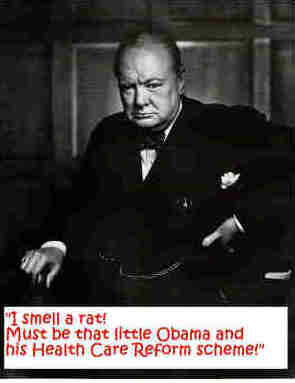
Ever since Emperor Obama banished Churchill's statue from the Oval Office, finding the comparison with true greatness too much for his insecure, thuggish ego to endure, a certain angry spook has been haunting the corridors of the White House, and it looks pretty much like this formidable personage.
Given enough rope, the current "administration" in the White House is
hanging itself with its own wanton abuses of power. The best solution to the
hijacking of the U.S. government, economy, the states, and society by a Karl Marx-loving group of displaced Windy City politicos is not to
shorten the rope now, but to give them all the rope they want and they will make a big enough
noose to hang them all themselves!

Chief Counsel to the Obama, he stands next to the God of Hope and Change, and his name means, "God With Us." How appropriate is that, except for one small hitch, this is no God by any stretch of the imagination. Their latest power grab is to take over the Internet services so they can suppress free speech on it and regulate the content as they please! Such hope and change they are bringing us--it is beyond description.




